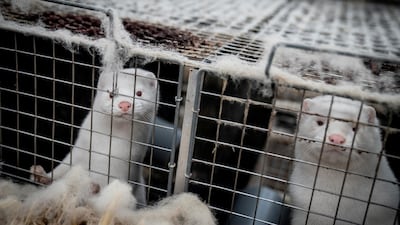Ireland is planning a mink cull over fears that a mutated version of the coronavirus disease could reach its shores.
All 120,000 mink should be culled "as a matter of urgency”, Chief Medical Officer Dr Tony Holohan told the Department of Agriculture.
One of the big fears of the mink mutation first reported in Denmark is its ability to jump from animal to human.
The department of health "indicated that the continued farming of mink represents an ongoing risk of additional mink-adapted (coronavirus) variants emerging," Dr Holohan said.
"Therefore, it has recommended that farmed mink in Ireland should be culled to minimise or eliminate this risk."
There are three mink farms, in Kerry, Donegal and Laois, housing around 120,000 of the animals.
The agriculture department said it "continues to engage with the mink farmers to consider the next steps".
A statement from Fur Europe, on behalf of the Irish farms, challenged the science behind the decision.
"While the Irish government is leaning on the recent Danish decision to cull all animals on these farms, it neglects to mention that the Danish decision was based on a rapid increase in the number of infected mink farms.
"This increase was triggered by many farms located in the same geographical area, but this is far from the case in Ireland, where there are just three farms in rural areas located in Kerry, Donegal and Laois.
“This decision will close down three safe, compliant and reputable farms on no scientific basis.”
Virologist Dr Gerald Barry, from University College Dublin, said he was surprised by the cull ruling, calling it a “bit of an over-reaction”.
Earlier this month Denmark – the world's largest producer of mink fur – announced a nationwide cull of 15 million-17 million animals after a mutated version of coronavirus was detected in farms and spread to humans.
On Thursday, the nation's health ministry said the mutation, which raised concerns over the effectiveness of any future vaccine, has likely been eradicated.
It said there had been no new cases detected since September 15 and that the strict restrictions it had imposed on seven municipalities in the North Jutland region, home to 280,000 people, would be lifted on Friday.
Denmark has culled about two-thirds of its mink population and still plans to complete the cull.


